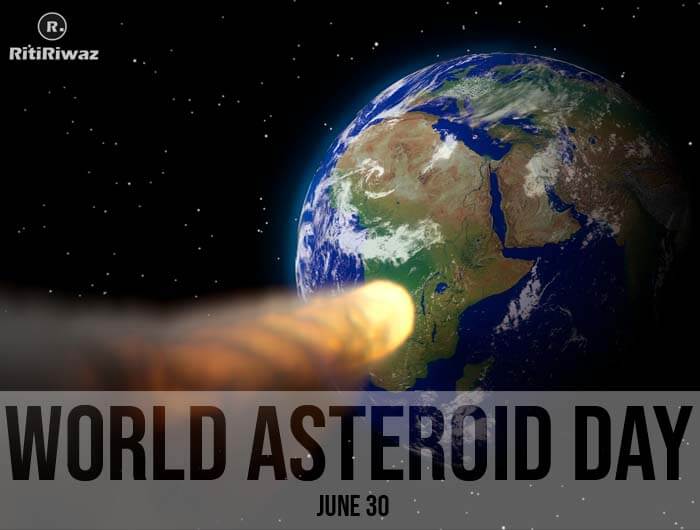World Asteroid Day – June 30th

Every year, on 30 June ( the anniversary of the Tunguska event ) people worldwide celebrate International Asteroid Day. A day devoted to making people aware of the risk of a future asteroid impact, and an opportunity to discuss how we can minimize this cosmic threat.
What is an Asteroid
The classification of celestial bodies large in size and orbit-dependent. Asteroids sometimes referred to as minor planets or planetoids, are large rocky bodies that do not have an atmosphere and are in orbit around the Sun. Occasionally something knocks them out of orbit, potentially setting the asteroid on a collision course with Earth.
Asteroids are often confused with meteors – typically a much smaller rock that enters the Earth’s atmosphere and vaporizes (more commonly known as a shooting star). Should an asteroid make it through the atmosphere and collide with Earth, it becomes a meteorite. So, the term “asteroid” is defined by the object’s location more than by anything else.
What is the Tunguska event?
The Tunguska asteroid event in Siberia, Russian Federation, was the largest asteroid impact in recorded history. On 30 June 1908, a fireball was seen streaking across the morning sky in a remote area of Russia. Seconds after, an explosion ripped through the air with enough energy to destroy an area of forest almost the size of Tokyo, flattening about 80 million trees.
The earth trembled, windows smashed, and in a town 60 kilometers away, people felt the heat from the blast. This event is now known as the Tunguska event. It is believed to have been caused by an asteroid at least twice the length of a blue whale, which exploded about 10 kilometers above Earth’s surface.
Tunguska event occurred 113 years ago, humanity wasn’t able to predict such events, but today we have many missions dedicated to finding and monitoring asteroids.
History
Asteroid Day was co-founded in 2014, by Dr. Brian May, astrophysicist and lead guitarist for the rock band Queen; Danica Remy, B612 President; Apollo 9 astronaut Rusty Schweickart; and filmmaker Grig Richters. Asteroid Day is held on 30 June each year to mark Earth’s largest asteroid impact in recorded history, the Siberia Tunguska event.
In 2013, an asteroid entered Earth’s atmosphere over Chelyabinsk, Russia. It exploded in the air, releasing 20 to 30 times more energy than that of the first atomic bombs, generating brightness greater than the sun, exuding heat, damaging more than 7,000 buildings, and injuring more than 1,000 people. The shock wave broke windows 58 miles away. It went undetected because the asteroid came from the same direction and path as the sun.
In 2016, Asteroid Day was declared by the United Nations as a global day of education to raise awareness about asteroids’ opportunities and risks. And it explains why astronomers and the Asteroid Day group want people to be aware. Detecting the threat of near-Earth objects, or NEOs, that could potentially cause grave harm is a primary focus of NASA and other space organizations around the world.
Global Events
Regionally organized large and small events are held on Asteroid Day, and range from lectures and other educational programs to live concerts and broader community events, to raise public awareness of the need for increased detection and tracking of asteroids.
This year with Pandemic the events are fully digital celebrations. Asteroid Day Live is streaming over Asteroid Day TV, and the detailed program schedule can be found on the Asteroid Day website. The programming will cover themes such as asteroid discovery, planetary defense, space resources, asteroid exploration missions, and more.
Suggested Read: Important Days In June
